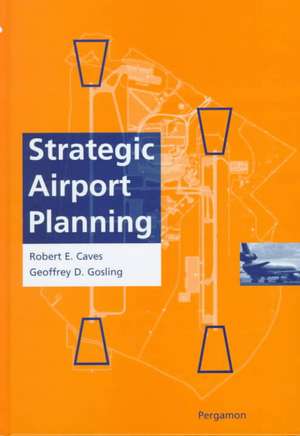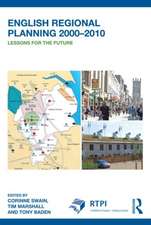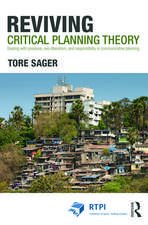Strategic Airport Planning
Autor Robert E. Caves, Geoffrey David Goslingen Limba Engleză Hardback – 30 mar 1997
The book will examine these pressures in order to identify changes that are required to the airport planning process. The major issues to be discussed are: forecasting in an uncertain world; airport market share; airline network choices; political settings and their consequences; economic justification and viability; environmental impacts and their mitigation; cooperative planning; and physical planning challenges. The issues will be illuminated by case studies of representative airport systems: intercontinental gateways, metropolitan multi airport system, provincial and regional airports and developing country systems. The final section will bring together suggestions for ways in which the industry can move forward to a green and profitable future with an appropriate provision of new capacity.
Preț: 1191.46 lei
Preț vechi: 1547.34 lei
-23% Nou
Puncte Express: 1787
Preț estimativ în valută:
228.01€ • 236.70$ • 190.13£
228.01€ • 236.70$ • 190.13£
Carte tipărită la comandă
Livrare economică 24 martie-07 aprilie
Preluare comenzi: 021 569.72.76
Specificații
ISBN-13: 9780080427645
ISBN-10: 0080427642
Pagini: 468
Dimensiuni: 170 x 227 x 31 mm
Greutate: 0.83 kg
Editura: Emerald Publishing
ISBN-10: 0080427642
Pagini: 468
Dimensiuni: 170 x 227 x 31 mm
Greutate: 0.83 kg
Editura: Emerald Publishing
Cuprins
Chapter heading and selected papers: List of Tables. Preface. Introduction. Context of Airport System planning. Challenges to the Traditional Planning Approach. The Evolving Context of Airport Planning. Environmental Concerns. Institutional Changes in the Aviation Sector. Towards a Strategic View of Planning. Stakeholders, Goals and Objectives. Constraints. Understanding Aviation System Behaviour. Airline Decisios. National Government Roles. Community Response to Airport Development. Airport Disbenefits. Jurisdictional Issues. Economics of Airport Development. Airport Revenues and Costs. Public Investment Priorities. Regional Airport System Planning. Metropolitan Airport Systems. Activity Allocation Models. National Airport System Planning. Implementation Strategies. Role of Analysis in Policy Formulation. United States Experience. The California Aviation System Plan. The Seattle "Flight Plan" Project. The United Kingdom Case The London System. Conclusions. The European Union Case. Airline Strategies. Power Relationships. National Airport Planning Cases. Greece. Norway. Competing Roles for Airports. Glasgow, Scotland. Montreal, Canada. Towards Improved Strategic Planning. Planning Techniques and Practices. Airport System Design. Conclusions. Lessons form Hindsight. Adapting Creatively for the Future. References. Index.
Recenzii
J.P. Hanlon
One can already envisage the volume being used as a text for a course in Airport Planning (e.g., at M.Sc. level) and also as a research tool for people working in the industry. Altogether this is an excellent book. Everyone with a serious interest in air transport should have a copy on their shelves. It is extremely well referenced and indexed, which renders it user-friendly for both students and practitioners.
Journal of Transport Geography
Mike Tretheway
This book should be a required reading for all airport planners - government and private sector. ... I recommend this book be added to your professional bookshelf."
Journal of Air Transport Management
One can already envisage the volume being used as a text for a course in Airport Planning (e.g., at M.Sc. level) and also as a research tool for people working in the industry. Altogether this is an excellent book. Everyone with a serious interest in air transport should have a copy on their shelves. It is extremely well referenced and indexed, which renders it user-friendly for both students and practitioners.
Journal of Transport Geography
Mike Tretheway
This book should be a required reading for all airport planners - government and private sector. ... I recommend this book be added to your professional bookshelf."
Journal of Air Transport Management













